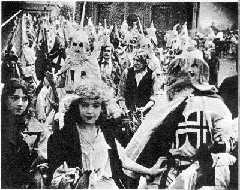
The Ku Klux Klan (KKK) and Woman's Christian Temperance Union (WCTU) shared a common interest in promoting and defending alcohol prohibition, women's suffrage, Protestantism, and the protection of domesticity. They also both shared hostility toward immigrants. For this reason, the two groups cooperated with each other and shared many members and leaders.

- The Ku Klux Klan was "revived in Atlanta in 1915 to defend Prohibition," which existed in Georgia at that time.1
- "Prohibition became one of the Klan's leading issues"2 and the Klan strongly supported both Prohibition and its strict enforcement.3
- The Ku Klux Klan "adopted prohibition as a central rallying cry."4
- "Enforcing Prohibition was a cornerstone of the KKK's ‘reform' agenda."5
- "Enforcement of Prohibition, in fact, was a central, and perhaps the strongest, goal of the Ku Klux Klan."6
- "Demon Rum (and the support of Prohibition) was the most obsessive issue on the Klan mind next to the pope."7
- The KKK's "support for Prohibition represented the single most important bond between Klansmen throughout the nation..."8 (Emphasis in original.)
- Because it so strongly "opposed the sale of alcohol,"9 the new Klan "attacked bootlegging."10

- "The Klan's resurgence in the 1920s partially stemmed from their role as the extreme militant wing of the temperance movement. In Arkansas, as elsewhere, the newly formed Ku Klux Klan marked bootleggers as one of the groups that needed to be purged from a morally upright community. In 1922, 200 Klansmen torched saloons that had sprung up in Union County in the wake of the oil discovery boom. The national Klan office ended up in Dallas, Texas, but Little Rock was the home of the Women of the Ku Klux Klan. The first head of this female auxiliary was a former president of the Arkansas WCTU." 11
- The rapid growth of the new Klan probably reflected the fact that "It promised to reform politics, to enforce prohibition, and to champion traditional morality."12
- There was much interaction and overlap in membership between the Klan and other prohibition supporters. For example, a top leader of the Klan, Edward Young Clarke, raised funds for both the Klan and the Anti-Saloon League.13
- Its enforcement of prohibition was one of the factors "most responsible for the Klan's great popularity" in some states and communities.14
- The KKK challenged bootleggers by organizing armed patrols to intercept shipments of alcohol.15
- "The Ku Klux Klan associated itself with the campaign against alcohol…. One of the major KKK activities in the 1920s was rooting out bootleggers and breaking up speakeasies."16
Watch the full episode. See more Ken Burns.

No comments:
Post a Comment